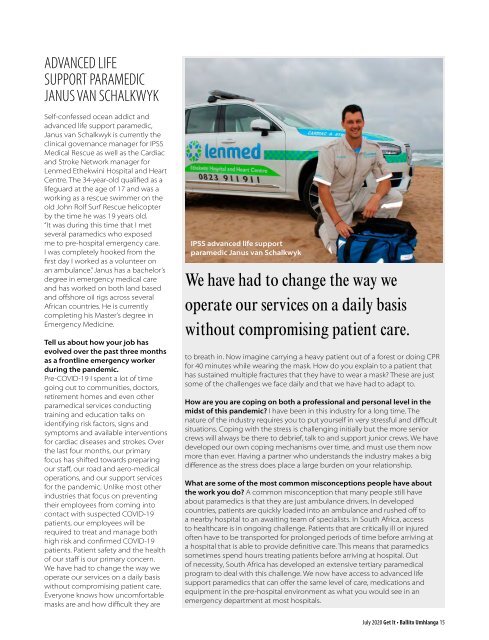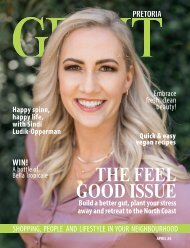July 2020 - Ballito Umhlanga
Conscious living. Thinking before you speak. Acting with intention. Placing careful thought into the things you do, eat and buy. This month we turn our attention to the art of being mindful. From making small changes like 'meat-free-Mondays' and choosing low or no-alcohol drinks, to listening to positive podcasts that encourage kindness (to yourself and others) and taking time out to care for your body, mind and soul … we are embracing all that is good and healthy.
Conscious living. Thinking before you speak. Acting with intention. Placing careful thought into the things you do, eat and buy. This month we turn our attention to the art of being mindful. From making small changes like 'meat-free-Mondays' and choosing low or no-alcohol drinks, to listening to positive podcasts that encourage kindness (to yourself and others) and taking time out to care for your body, mind and soul … we are embracing all that is good and healthy.
You also want an ePaper? Increase the reach of your titles
YUMPU automatically turns print PDFs into web optimized ePapers that Google loves.
ADVANCED LIFE<br />
SUPPORT PARAMEDIC<br />
JANUS VAN SCHALKWYK<br />
Self-confessed ocean addict and<br />
advanced life support paramedic,<br />
Janus van Schalkwyk is currently the<br />
clinical governance manager for IPSS<br />
Medical Rescue as well as the Cardiac<br />
and Stroke Network manager for<br />
Lenmed Ethekwini Hospital and Heart<br />
Centre. The 34-year-old qualified as a<br />
lifeguard at the age of 17 and was a<br />
working as a rescue swimmer on the<br />
old John Rolf Surf Rescue helicopter<br />
by the time he was 19 years old.<br />
“It was during this time that I met<br />
several paramedics who exposed<br />
me to pre-hospital emergency care.<br />
I was completely hooked from the<br />
first day I worked as a volunteer on<br />
an ambulance.” Janus has a bachelor’s<br />
degree in emergency medical care<br />
and has worked on both land based<br />
and offshore oil rigs across several<br />
African countries. He is currently<br />
completing his Master’s degree in<br />
Emergency Medicine.<br />
Tell us about how your job has<br />
evolved over the past three months<br />
as a frontline emergency worker<br />
during the pandemic.<br />
Pre-COVID-19 I spent a lot of time<br />
going out to communities, doctors,<br />
retirement homes and even other<br />
paramedical services conducting<br />
training and education talks on<br />
identifying risk factors, signs and<br />
symptoms and available interventions<br />
for cardiac diseases and strokes. Over<br />
the last four months, our primary<br />
focus has shifted towards preparing<br />
our staff, our road and aero-medical<br />
operations, and our support services<br />
for the pandemic. Unlike most other<br />
industries that focus on preventing<br />
their employees from coming into<br />
contact with suspected COVID-19<br />
patients, our employees will be<br />
required to treat and manage both<br />
high risk and confirmed COVID-19<br />
patients. Patient safety and the health<br />
of our staff is our primary concern.<br />
We have had to change the way we<br />
operate our services on a daily basis<br />
without compromising patient care.<br />
Everyone knows how uncomfortable<br />
masks are and how difficult they are<br />
IPSS advanced life support<br />
paramedic Janus van Schalkwyk<br />
We have had to change the way we<br />
operate our services on a daily basis<br />
without compromising patient care.<br />
to breath in. Now imagine carrying a heavy patient out of a forest or doing CPR<br />
for 40 minutes while wearing the mask. How do you explain to a patient that<br />
has sustained multiple fractures that they have to wear a mask? These are just<br />
some of the challenges we face daily and that we have had to adapt to.<br />
How are you are coping on both a professional and personal level in the<br />
midst of this pandemic? I have been in this industry for a long time. The<br />
nature of the industry requires you to put yourself in very stressful and difficult<br />
situations. Coping with the stress is challenging initially but the more senior<br />
crews will always be there to debrief, talk to and support junior crews. We have<br />
developed our own coping mechanisms over time, and must use them now<br />
more than ever. Having a partner who understands the industry makes a big<br />
difference as the stress does place a large burden on your relationship.<br />
What are some of the most common misconceptions people have about<br />
the work you do? A common misconception that many people still have<br />
about paramedics is that they are just ambulance drivers. In developed<br />
countries, patients are quickly loaded into an ambulance and rushed off to<br />
a nearby hospital to an awaiting team of specialists. In South Africa, access<br />
to healthcare is in ongoing challenge. Patients that are critically ill or injured<br />
often have to be transported for prolonged periods of time before arriving at<br />
a hospital that is able to provide definitive care. This means that paramedics<br />
sometimes spend hours treating patients before arriving at hospital. Out<br />
of necessity, South Africa has developed an extensive tertiary paramedical<br />
program to deal with this challenge. We now have access to advanced life<br />
support paramedics that can offer the same level of care, medications and<br />
equipment in the pre-hospital environment as what you would see in an<br />
emergency department at most hospitals.<br />
<strong>July</strong> <strong>2020</strong> Get It • <strong>Ballito</strong> <strong>Umhlanga</strong> 15


















